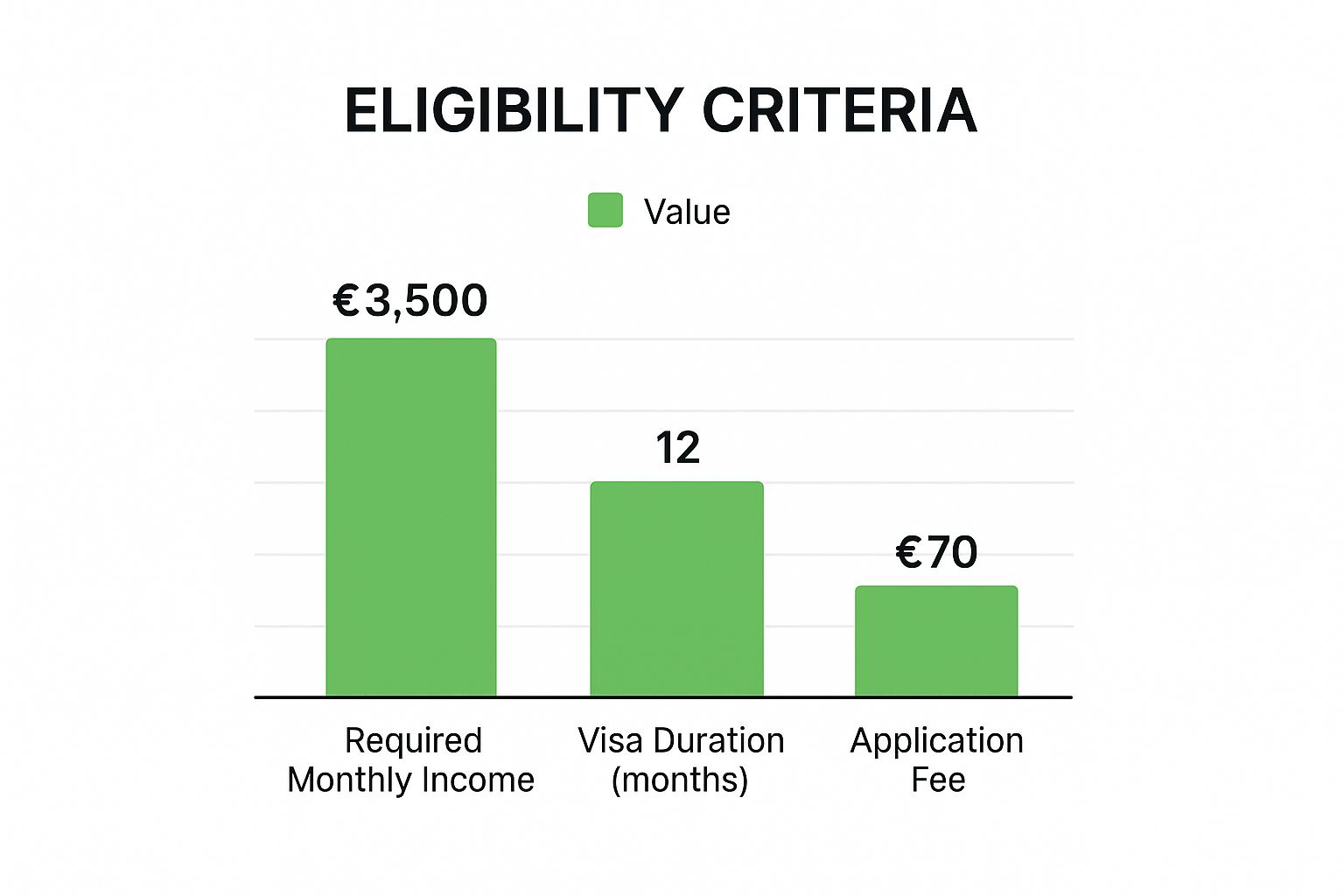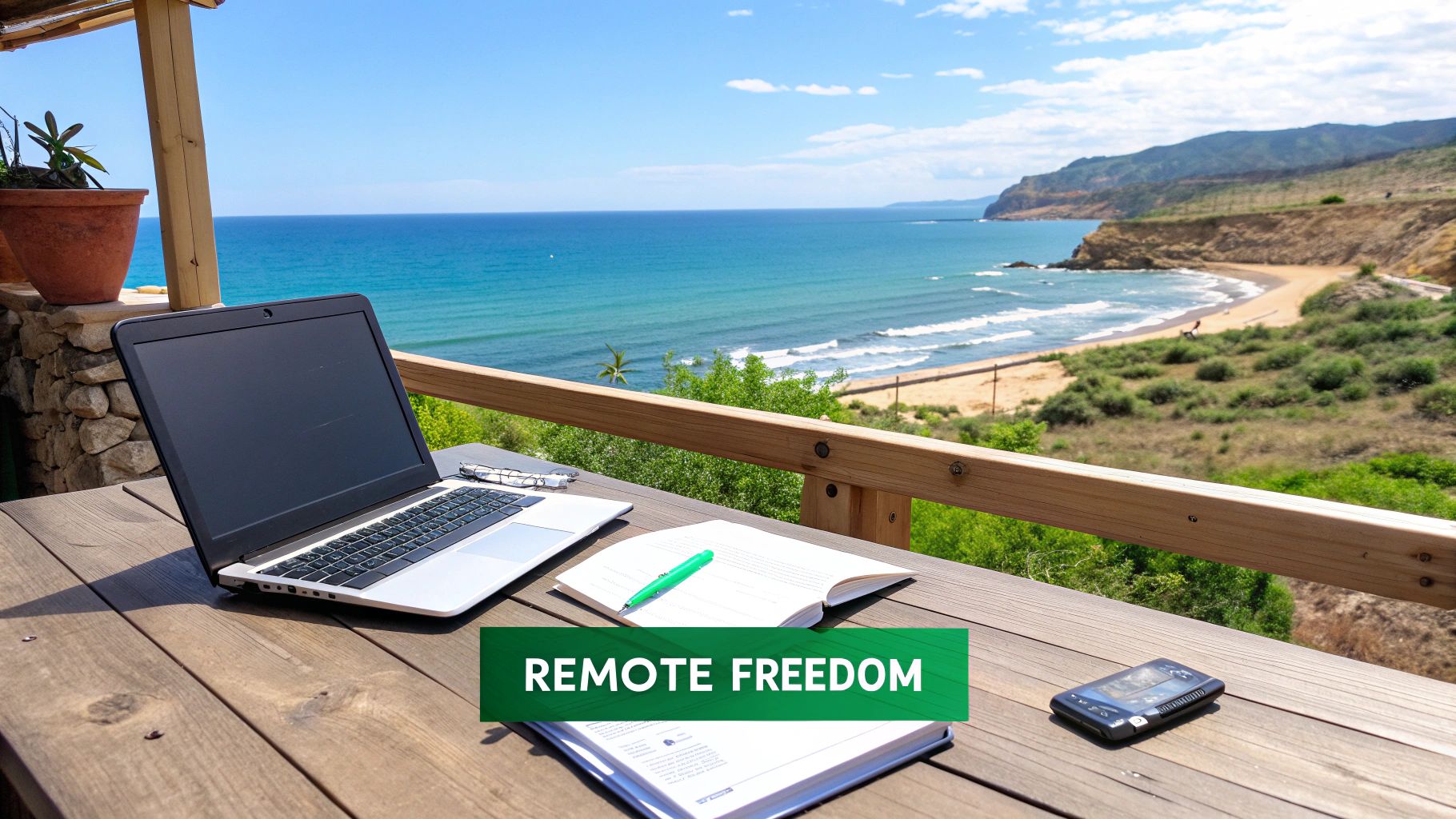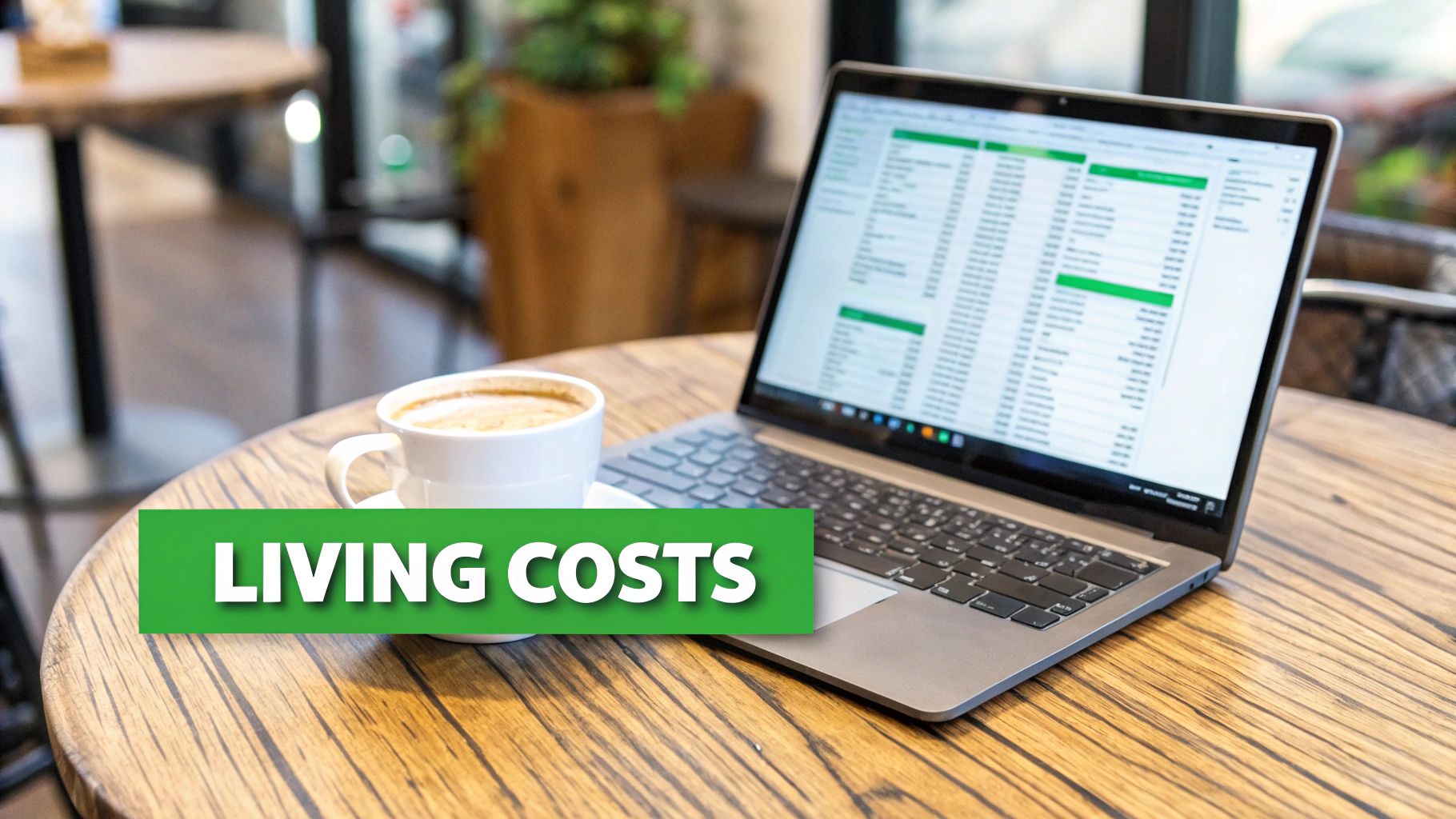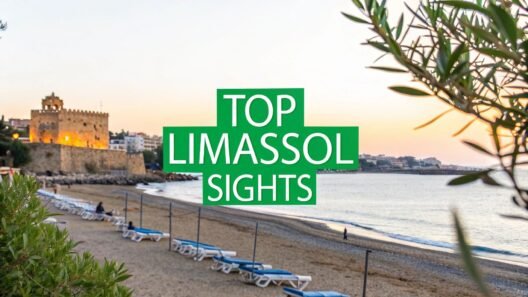Understanding Cyprus's Digital Nomad Programme Reality
Let's get one thing straight: Cyprus isn't the wild, bustling heart of Europe's digital nomad scene. If you're chasing the high-energy nightlife of Berlin or the creative chaos of Lisbon, this might not be your spot. But if you're after a stable, sunny, and incredibly practical EU base to get work done, the digital nomad visa Cyprus offers is a seriously compelling option. The whole program was built for a specific kind of remote worker, and knowing if that's you is the first step.
Why the High Price Tag?
The first thing that makes most people pause is the income requirement: €3,500 net monthly income. That number isn't just pulled out of a hat. It's a deliberate filter. Cyprus isn't trying to be the next backpacker hotspot; it's positioning itself as a premium destination for established professionals who can plug into the local economy without causing a strain. By setting the bar high, the government ensures visa holders are financially self-sufficient, creating a more stable and sustainable community of remote workers.
A Post-Brexit Advantage for Brits
For UK citizens, Brexit has, in a strange way, made getting residency in Cyprus much clearer. Before, Brits were EU citizens with their own set of rules. Now, as "third-country nationals," they fit perfectly into the exact group this digital nomad visa was designed for. There are no more grey areas. The visa offers a direct, structured path to living and working remotely from an EU country, a process that has become a headache elsewhere. It's a clear-cut opportunity for UK pros who want a Mediterranean lifestyle with the comfort of an English-speaking environment.
The program's popularity shot up so fast that it was temporarily paused after hitting its initial limit. But in a show of confidence, the Cyprus Digital Nomad Visa Scheme officially reopened for applications in March 2025. The government didn't just reopen it; they doubled the original limit from 500 to a new total of 1,000 available permits. This move shows a real commitment to attracting remote workers from outside the EU and EEA, especially those who meet the strict €3,500 net monthly income requirement. Find out more about the visa cap expansion.
Official news often comes through local immigration experts, who break down what the updates mean for applicants.
This is why it pays to follow reliable local sources, as the rules and availability can and do change.
What Is Life Really Like?
So, if you meet the requirements, what's the payoff? It’s a lifestyle that favors balance over burnout. Life in Cyprus moves at a slower, more intentional pace. Instead of a packed social calendar, think weekend hikes in the Troodos Mountains or finishing your workday and heading straight to the beach for a swim. It’s a place where you can actually hear yourself think.
English is spoken everywhere, which makes the logistics of setting up your life far less stressful. You're getting a safe, community-focused environment with over 300 days of sunshine a year. It’s the perfect backdrop for deep, focused work, allowing you to build a career that doesn't demand you sacrifice your well-being.
Who Actually Gets Approved for This Visa
Let's be real, the high bar for the Cyprus digital nomad visa is there for a reason. It’s a filter designed to bring in established professionals. While many people get fixated on the headline income number, the officials reviewing your application are more interested in the story behind your earnings. They're looking for stability, consistency, and solid proof that you're a self-sufficient professional who won't need to lean on local support. Getting this narrative right is what separates a quick approval from a frustrating rejection.
The €3,500 Net Monthly Income Test
This is the number one tripwire where most applications stumble. The most important word here is "net." For applicants from the UK, this means the amount left after HMRC has taken its share through income tax and National Insurance. So many hopefuls make the mistake of using their gross monthly salary, and their application is rejected before it even gets going. The authorities need to see a steady flow of at least €3,500 (or the GBP equivalent) landing in your bank account every month.
So, what kind of income actually counts? They strongly prefer money that is stable and predictable.
- A regular salary from a remote employer based outside of Cyprus.
- Consistent monthly retainers from long-term freelance clients.
- Regular dividend payments from a business you own, fully supported by your company's financial records.
What they are not looking for are sporadic, inconsistent payments. If you land a huge project fee one month and then have zero income for the next two, that won't work, even if the average meets the threshold. You need to prove you can support yourself every single month without fail. Think of it less like a balance check and more like a detailed cash flow review.
This chart gives you a quick visual breakdown of the visa's main financial and time-based requirements.

As you can see, the program is clearly focused on one thing: a high, stable income is the main qualifier. The other administrative tasks, like the fees, are much lower hurdles.
How Different Applicants Should Frame Their Income
The way you work dictates the evidence you need to provide. A PAYE employee will have a much more straightforward time than a freelancer juggling multiple clients. The goal is always the same: create a paper trail that is crystal clear and leaves no room for doubt. For UK applicants, this means putting together a package of documents that tells the right financial story.
To help you get it right, here’s a clear breakdown of the income requirements and key documents needed for different types of remote workers applying from the UK.
Visa Eligibility by Income Source and Employment Type
Clear breakdown of income requirements and documentation standards for different types of remote workers applying from the UK
| Applicant Category | Income Proof Required | Key Documentation | Common Pitfalls to Avoid |
|---|---|---|---|
| Remote Employee | A stable, recurring salary from a company registered and operating outside of Cyprus. | Your last 6 months of payslips, a signed employment contract, and recent bank statements clearly showing the salary deposits. | Handing in an employment contract that doesn't explicitly state you have permission to work remotely from another country. |
| Freelancer/Sole Trader | A consistent flow of monthly income from various clients. | Signed client contracts or service agreements, invoices from the last 6+ months, bank statements showing client payments, and your latest tax returns (Self Assessment). | Having fluctuating income without including a cover letter that explains why (e.g., the seasonal nature of your industry). |
| Limited Company Director | A combination of a director's salary (processed via PAYE) and official dividend payments. | Your director's employment contract, official dividend vouchers, your company’s bank statements, and your personal bank statements. | Blurring the lines between personal and business finances. You must clearly show the difference between your salary and profit distributions. |
The key takeaway from this is that no matter how you earn your income, the burden of proof is on you. A well-organized, easy-to-follow set of documents is your best friend in this process.
Common Misconceptions That Lead to Rejection
Beyond just the income figures, a few myths about the Cyprus digital nomad visa frequently trip up applicants from the UK. Knowing what these are ahead of time can save you a lot of trouble.
First, let's talk about the nature of your work. You absolutely must be working for companies or serving clients that are located entirely outside of Cyprus. This visa is not a shortcut into the local job market. Any suggestion that you plan to look for work locally is a guaranteed rejection.
Another major point of confusion revolves around savings. While having enough money is important, a large sum sitting in a savings account cannot be used as a substitute for the monthly income requirement. An officer wants to see a predictable €3,500+ flowing into your account each month, not a large but static balance that will eventually run out.
Finally, while there isn't an official age limit, the demanding income requirement naturally means that successful applicants are usually experienced professionals. This isn't really a visa for someone just starting their remote work career. It’s built for people who have a proven history of high, stable earnings and are looking for a beautiful and reliable base in the EU.
Getting Your Paperwork Right the First Time
This is where the dream of working with a Mediterranean view gets real. The success of your digital nomad visa Cyprus application isn't just about wanting to move; it's about flawlessly executing the paperwork. Think of it as building a case for yourself, presenting a clear and undeniable profile to the Cypriot Civil Registry and Migration Department. A single missing signature or an incorrect document can set you back weeks, if not months.

The Core Documents: More Than Just a Checklist
Viewing your application as a simple checklist is a common mistake. Each document tells a part of your story, proving you're a responsible, self-sufficient professional who will be an asset to Cyprus, not a burden. Your job is to make that story compelling and easy to follow.
Let's start with the basics. You'll need a valid passport with at least two blank pages that remains valid for your entire one-year stay, plus a few extra months just in case. You also have to fill out the official application form (MIP1) perfectly. Treat it like a legal contract—no scribbled corrections or guesswork allowed.
The proof of income section is where many applications stumble. You must prove a consistent net monthly income of €3,500 after taxes. This isn’t about showing one great month. You will absolutely need:
- A minimum of six months of recent bank statements. These should clearly show your salary landing in your account. Pro tip: If your statements are cluttered with other transactions, consider using a highlighter on the relevant salary deposits to make the reviewer's job easier.
- An employment contract and a formal letter of support. This is crucial. Your contract should ideally state that you can work remotely. Even better, ask your HR department for an official letter on company letterhead that confirms your remote work status, role, and salary. This adds a huge amount of credibility to your application.
UK-Specific Hurdles: Navigating Apostilles and Health Insurance
If you're applying from the UK, there are a couple of specific bureaucratic steps you cannot miss. These are designed to prove your UK documents are authentic to a foreign government, and they are non-negotiable.
First up is your criminal record check. A standard Basic DBS check from the UK won't cut it. You must get an ACRO Police Certificate, a more detailed report from the police computer. Make sure this certificate is recent, typically issued within the last six months.
Once you have the ACRO certificate, it must be apostilled. An apostille is an official certificate attached by the UK’s Foreign, Commonwealth & Development Office (FCDO) that authenticates the signature on your document, making it legally recognised in Cyprus. Submitting a police check without an apostille is an instant reason for rejection.
Finally, you need proof of comprehensive health insurance. A standard travel policy is not enough. You must have a private medical plan that covers you in Cyprus for both inpatient and outpatient care for the full year.
To help you get a clear picture of the process, we've put together a detailed checklist specifically for UK applicants. This table breaks down what you need, how to get it, and what to expect in terms of time and cost.
| Required Document | UK Processing Method | Timeline Needed | Estimated Cost |
|---|---|---|---|
| Valid Passport | Check validity. Renew via HM Passport Office if needed. | 3-10 weeks for renewal | £88.50 for standard renewal |
| Application Form (MIP1) | Download from the Civil Registry and Migration Dept. website. | 1-2 hours to complete | Free to download |
| Proof of Income | Download 6+ months of statements from your online bank. | Instant | Free |
| Employment Contract/Letter | Request from your employer's HR department. | 1-2 weeks | Free |
| ACRO Police Certificate | Apply online via the ACRO Criminal Records Office. | 10-30 working days | £65 – £105 |
| Apostille for ACRO Cert. | Submit certificate to the UK FCDO Legalisation Office. | 2-10 working days | £45+ (plus courier fees) |
| Health Insurance Policy | Purchase from a private provider covering Cyprus. | 1 day | Varies (£40-£100+ per month) |
| 1-Year Rental Agreement | Secure a property in Cyprus through an agent or online. | 1-4 weeks | Deposit + 1 month's rent |
As you can see, obtaining the ACRO certificate and getting it apostilled are the longest parts of the process. Our advice is to start on these two items as soon as you decide to apply.
Putting It All Together: Timing and Presentation
The final challenge is choreographing everything so it comes together perfectly. Many of your documents, like the police check and bank statements, have an expiry date. With an application review time of 5 to 7 weeks (and sometimes longer), you need to gather your documents strategically so nothing becomes outdated while you wait.
One of the biggest pre-application steps is finding a place to live. You must submit a signed rental agreement for a minimum of one year. Yes, this means committing to a property before you even have your visa. It’s a leap of faith, so starting your research early is key. To get a feel for the market, check out our guide on long-term rentals in Cyprus, which is packed with local insights.
When you're ready to submit, don’t just show up with a chaotic stack of papers. Organise everything in a folder, label your documents, and create a simple cover sheet listing the contents. It’s not just about being tidy—it shows respect for the process and makes you look like the organised, serious applicant you are. Your goal is to make their job so easy they have no reason to say no.
Navigating the Application System Like a Pro
Once you've gathered all your documents, it's time to tackle the application itself. This is where a bit of insider knowledge goes a long way, transforming what could be a stressful process into a manageable one. The Cypriot system has its own unique pace, and learning how to work within it is your key to a successful outcome.

The In-Person Submission: Your Day in Nicosia
Here's a detail that often surprises UK applicants: you can't apply for the digital nomad visa Cyprus from your living room. You must submit your application in person at the Civil Registry and Migration Department office in Nicosia after you’ve landed in Cyprus. For Brits, this is no problem, as you can enter the country visa-free for up to 90 days, giving you a generous window to get this done.
Think of your appointment as a formal meeting where your paperwork speaks for you. Those who have success often say the process is surprisingly quick, but only if they are perfectly prepared. Make sure your documents are in the exact order listed on the official checklist and keep them in a single, neat folder. You'll pay the initial application fee of €70 when you hand everything over. Showing up this organized demonstrates that you're a serious applicant who respects their time.
The Waiting Game: Decoding the Silence
After submitting your file, your patience will be put to the test. The official processing time is quoted as 5 to 7 weeks, but it's wise to mentally prepare for it to take a little longer. Like in much of Southern Europe, bureaucracy has its own rhythm. You won't receive a flood of email updates, which is where many people start to feel anxious, constantly checking for news that isn't there yet.
You'll get a receipt with an application number, which you can use to track the progress, but the updates can be a bit cryptic. A status like "Pending" might just mean your file is waiting in a queue. The one you're hoping to see is "Under Examination," which means an officer has finally started reviewing your application. It’s perfectly normal for the status not to budge for weeks. The best thing you can do is trust your preparation and use the downtime to actually start your adventure—explore the island and find your new favorite cafe.
When and How to Communicate
So, what happens if the department asks for more information? Don't panic. A request for clarification isn't a bad sign; it’s your chance to make your application even stronger. If they need more details, they will usually reach out via email.
When you reply, just stick to these simple guidelines:
- Answer the specific question. Avoid telling a long story or sending documents they didn't request.
- Be quick. Acknowledge their email right away and send what they need as soon as possible.
- Stay professional. Always use a polite and formal tone in your correspondence.
Many UK nomads find it incredibly helpful to hire a local lawyer or immigration agent from the get-go. While it's an extra expense, they understand the system's unwritten rules, speak Greek, and can act on your behalf. This support can be a game-changer, especially if your work situation is a bit complicated, taking the guesswork out of getting your digital nomad visa Cyprus approved.
The Real Costs Beyond Application Fees

It’s easy to look at the official fees for the digital nomad visa Cyprus and think you’ve got it all figured out. A €70 application fee and another €70 for the residence permit seems incredibly reasonable. But those numbers are just the tip of the iceberg, and they can give a false sense of security about the actual financial commitment.
The real costs are tucked away in the preparation, the physical move, and all the details of setting up a new life on the island. Smart budgeting means looking past the government charges and planning for every expense, from getting documents apostilled in your home country to handing over a hefty rental deposit in Paphos.
The Hidden Costs of Your Application Package
Before you can even hand in your application, you’ll find yourself spending money. If you're applying from the UK, for instance, you'll need an ACRO police certificate, which can set you back up to £105. Then, you have to get it apostilled by the FCDO, adding another £45 plus courier fees to the bill. These are non-negotiable steps.
The biggest pre-approval expense, however, is often the health insurance. You’re required to have a policy that provides full coverage in Cyprus for the entire year, and most insurance companies will ask for the full premium upfront. This could easily mean paying £500 to £1,200 out of pocket before you even know if your visa has been granted.
Budgeting for Your First Month on the Ground
Once you arrive, the expenses start to pile up fast. Your largest single cost will be securing a place to live, as the visa requires a one-year rental agreement. Most landlords will ask for a security deposit equal to one or two months' rent, plus the first month paid in advance.
So, if you find a nice two-bedroom apartment for €1,200 a month, you’ll need to have €3,600 ready to go immediately. On top of that, you'll have smaller setup costs for utilities like electricity and water, not to mention an internet installation fee. These initial expenses often catch people by surprise, especially if they've only budgeted for the visa fee.
Managing Your Money: UK to Cyprus
When it’s time to transfer a large sum for your deposit from pounds to euros, don't just default to your high-street bank. You could lose a surprising amount of money to poor exchange rates and high transfer fees. Services like Wise or Revolut are a nomad's best friend, offering much better rates for these larger transfers.
Also, be prepared for the local banking process to be a bit slow. Opening a Cypriot bank account often requires your official residence permit, which you won't have right away. For the first few months, you’ll probably be relying on a UK-based digital bank with good euro features, so make sure you have one ready.
Building Your Financial Safety Net
Finally, let's talk about the emergency fund—a critical part of your budget that many people forget. Beyond all your setup costs, it's a good idea to have at least three months' worth of living expenses saved in an account you can access easily. This isn't just for your own peace of mind.
This fund acts as a practical buffer for any visa processing delays, an unexpected trip back home, or covering the excess on your health insurance if needed. This financial cushion is what allows you to handle any bumps in the road without derailing your Cyprus adventure. It also gives you the freedom to relax and explore while you wait. Our Cyprus travel itinerary has some great ideas for weekend trips to get you started.
Insider Strategies That Actually Improve Your Chances
Submitting your application for the Cyprus digital nomad visa is just the first step. Getting it approved requires more than just meeting the basic criteria. There's a certain art to presenting yourself as the perfect candidate, and these are the insider tips that successful applicants use.
Tell a Clear Financial Story
The biggest hurdle for many is proving that consistent €3,500 net monthly income, especially for freelancers or business owners with fluctuating cash flow. Don't just dump six months of confusing bank statements on an immigration officer's desk and hope for the best. Instead, write a simple, one-page financial cover letter to connect the dots for them.
If you had a slow month, explain it briefly. For instance, you could note a "seasonal dip common in my industry, which was balanced by higher earnings in the following months." This simple, proactive step shows you're transparent and professional. You're not hiding anything; you're guiding the officer through your financial history, leaving no room for doubt.
Master the Art of Timing and Communication
You technically have 90 visa-free days to apply after you land in Cyprus, but don't wait until the last minute. The sweet spot is submitting your application within your first month. This demonstrates that you're organized and serious, and it gives you a comfortable buffer for the 5 to 7-week processing time.
If the Migration Department contacts you for more information, be direct and concise. Answer only the question they asked and provide only the document they requested. Over-explaining or sending extra paperwork can create confusion and actually slow down your application.
It's also helpful to manage your expectations about Cyprus itself. While the visa process is straightforward, the country is intentionally selective. The initial cap was just 127 visas by August 2022, which grew to 500 by February 2024, and has since been expanded to 1,000. This, combined with the high income threshold, shows Cyprus is looking for high-earning professionals, particularly from places like the UK, who can contribute to the local economy. They are building a stable community, not a fleeting party scene. You can discover more digital nomad trends and statistics to see how this fits into the bigger picture.
Avoid These Seemingly Small, Fatal Errors
Many applications are rejected for simple, entirely avoidable mistakes. Getting these details right can be the difference between a smooth approval and a frustrating denial.
- Forgetting the Apostille: Your UK ACRO police certificate is essentially just a piece of paper without the official FCDO apostille. This is an absolute must-do, with no exceptions.
- Vague Employment Letter: Your letter from your employer needs to be crystal clear. It must explicitly state that you have permission to perform your job remotely from Cyprus. Any ambiguity on this point is a major red flag.
- The Wrong Health Insurance: Your standard travel insurance policy won't work here. You must have comprehensive private health insurance that provides coverage for the entire year you plan to stay.
- Not Being Patient: The waiting game is tough, but it's also your first real taste of the local culture. Embrace the 'siga-siga' (slowly, slowly) lifestyle. Instead of obsessively checking your email, use the time to explore your new home. Why not start by checking out our guide to the best restaurants in Cyprus?
Troubleshooting Common Problems and Next Steps
So, you’ve sent off your application for the **digital nomad visa Cyprus**. Even if you’ve prepared everything perfectly, sometimes things don’t go exactly to script. The real skill isn’t just in the preparation, but in how you handle the bumps along the way.
When the Waiting Game Becomes a Marathon
Let’s be real: the official 5-to-7-week processing window is more of a suggestion than a strict deadline. It's not unusual for the wait to stretch out, which can be stressful. Bombarding the Migration Department with calls and emails won't speed things up and can be counterproductive.
Instead, use this extra time wisely. Go explore your new town, find a favorite café, and actually start living here. You can check your application status online from time to time, but try not to fixate on it. Seeing a "Pending" status for weeks is totally normal. Remember, if you're coming from the UK, your 90-day visa-free entry is a generous buffer built for these kinds of delays. Have faith in your paperwork and embrace the slower Cypriot way of life.
Responding to a 'No' or a Request for More Info
Getting an email from the migration office can make your heart jump, but a request for more information is a good sign! It means someone is actively working on your application. Your job is to respond quickly and with exactly what they've asked for. If they request a specific bank statement, just send that one. Adding extra documents they didn't ask for can overcomplicate things.
A rejection, on the other hand, can feel like a major setback, but it’s rarely the end of the line. First, you need to understand the precise reason why you were denied. Was there a problem with your apostilled police record? Did they have an issue with your proof of income? These are often fixable issues. For anything more complex, especially with family applications where one person's issue affects everyone, hiring a local solicitor is a smart move. They understand the system and can help you build a solid plan to reapply.
You're Approved! What's Next?
That approval email is a massive relief, but you’re not quite at the finish line. The next step is an invitation back to the Migration Department. Here, you'll pay the final €70 fee and provide your biometric data—they’ll take your fingerprints and a photo for your official residence card.
This card, often called the "pink slip," is your official proof of legal residence in Cyprus, so don’t skip this final step. It's also a good time to think about the future. The initial visa is for one year, but you can renew it twice. Keep flawless records of your income and maintain your health insurance throughout your stay; you’ll need to show you still meet all the criteria when it’s time for renewal.
When Cyprus Isn't the Right Fit
Let's be honest, sometimes a plan just doesn't pan out. If your application is ultimately denied or you discover that life in Cyprus simply isn't for you, try not to see it as a waste of effort. All that work you did gathering your documents is incredibly useful.
You now possess an organized, apostilled, and translated portfolio that validates your professional and financial status. This package can give you a massive head start if you decide to apply for another European digital nomad program in a country like Greece or Portugal, which often have similar document requirements.
Feeling a bit overwhelmed by the process? That's completely normal. The key is to break it down into manageable chunks. To get excited about the lifestyle that’s waiting for you and start planning your adventure, explore the fantastic destinations and local secrets we've shared at SayCyprus.com.












